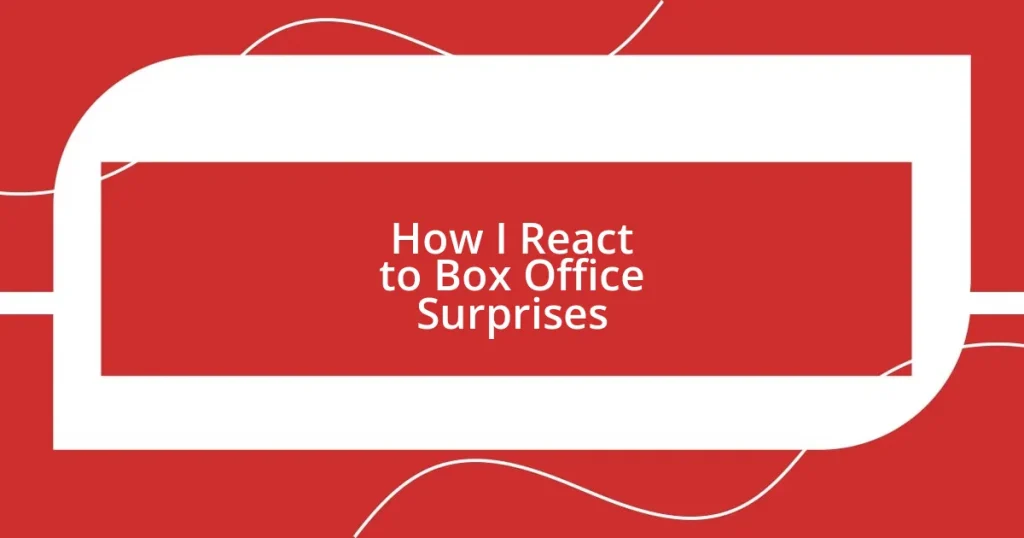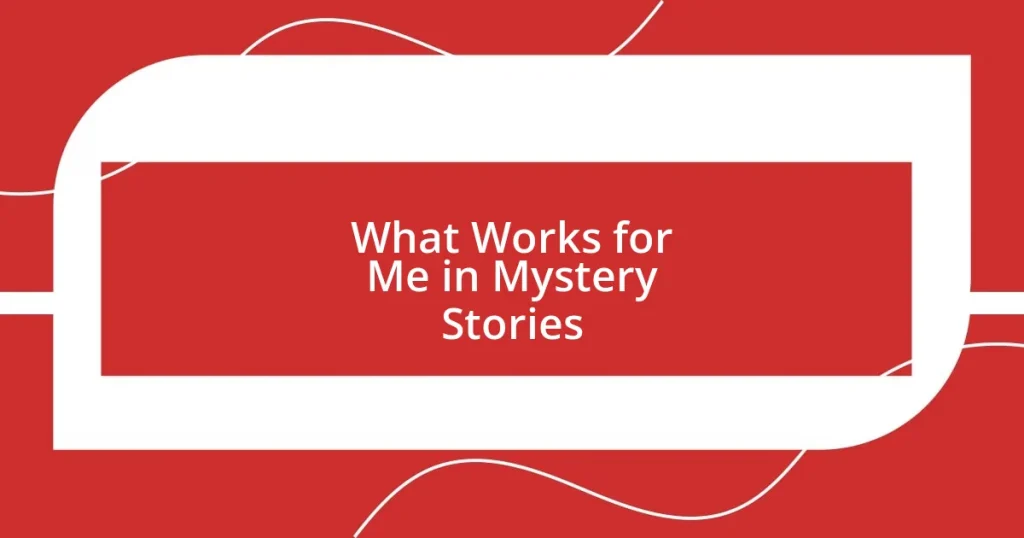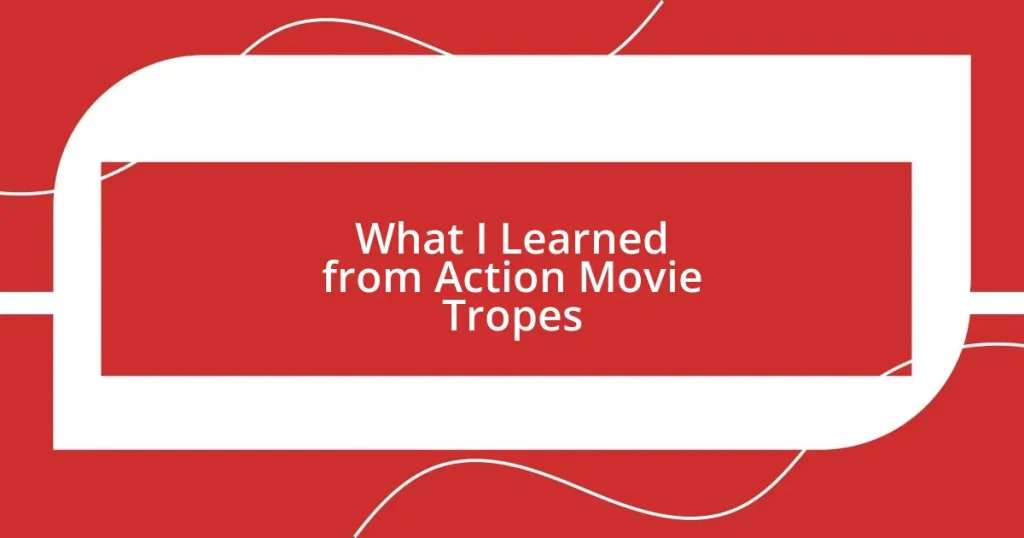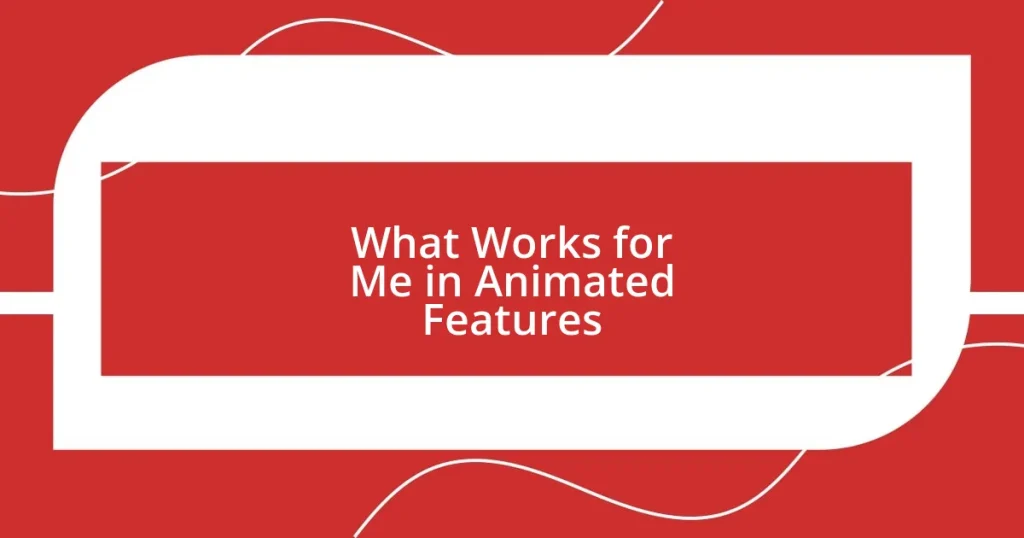Key takeaways:
- Box office surprises, such as sleeper hits and cultural phenomena, reflect audience preferences and cultural shifts, showcasing the unpredictable nature of cinema.
- Tracking trends and analyzing audience reactions help movie enthusiasts understand the impact and reception of films, influencing future expectations.
- Engaging in discussions about film enhances appreciation and reveals personal connections to storytelling, emphasizing the subjective nature of cinema.
- Adjusting expectations for future releases allows viewers to embrace bold storytelling choices and recognize the potential of unique narratives in cinema.
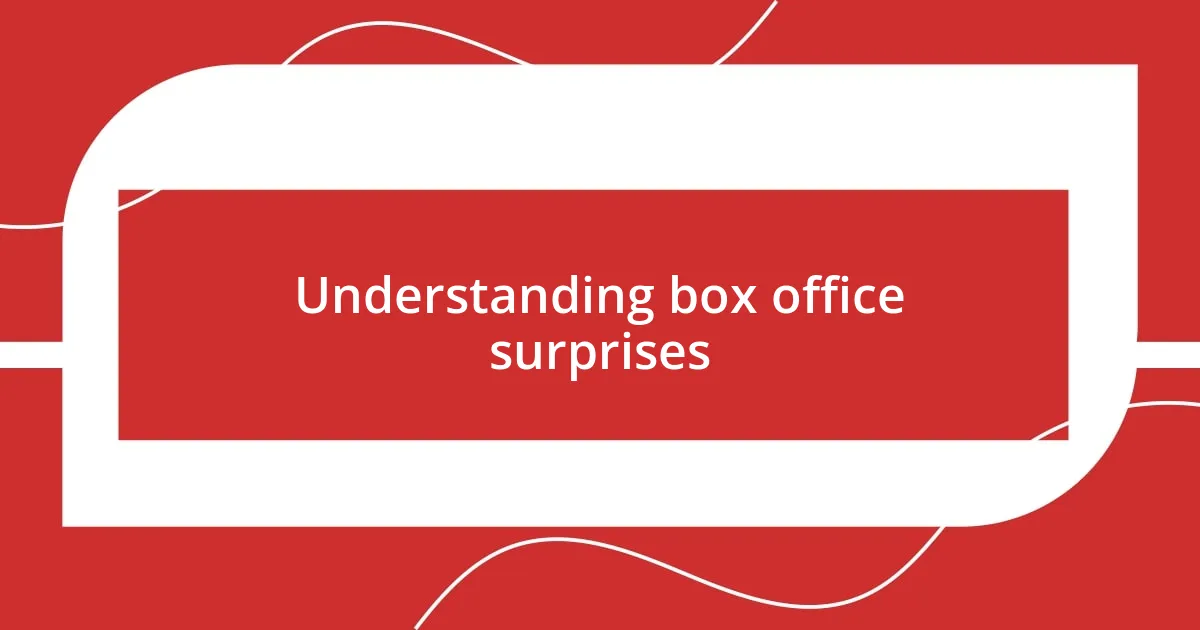
Understanding box office surprises
Box office surprises can be thrilling, often defying expectations set by early trailers or marketing. I recall the excitement in the theater when a little indie film, which I expected to fade quietly into oblivion, ended up resonating deeply with the audience and turning into a sleeper hit. Isn’t it fascinating how sometimes a movie just clicks with people in ways we never anticipate?
The dynamics at play in box office performance are multi-faceted. Factors such as timing of release, competition from other films, or even social media buzz can turn a seemingly standard release into a sensation overnight. Have you noticed how a word-of-mouth recommendation can elevate a film’s status? It’s like magic when a forgotten flick suddenly captures the public’s imagination.
When I see unexpected numbers emerge from the box office, it feels like an unveiling of a cultural phenomenon. It’s a reminder that films touch our lives in ways that transcend mere entertainment; they become part of our shared experiences. Who wouldn’t get a little emotional watching their once underdog favorite become a mainstream success?

Types of box office surprises
Box office surprises come in various forms, each with its own intriguing backstory. I remember the buzz surrounding an animated film that everyone thought would be just another forgettable sequel. Instead, it blew past expectations, with audiences nearly packing theaters. There’s something heartwarming about when an underdog finds its audience—it’s like watching a friend finally achieve their dreams.
Here are some common types of box office surprises:
- Sleeper Hits: These films often start slowly, gaining momentum through word of mouth and unexpected positive reviews.
- Blockbuster Bombs: Conversely, some films with massive marketing budgets and star power fail to resonate, catching many off guard.
- Genre Benders: Movies that mash up or redefine genres can shock viewers with their fresh take, leading to unexpected success.
- Cultural Phenomena: Occasionally, a film touches on societal themes or trends, sparking conversations that propel it to box office heights.
- Limited Releases: Indie films released in select theaters that break through to wider audiences often highlight our collective curiosity for genuine storytelling.
Understanding these types of surprises deepens my appreciation for the cinematic world. Each unexpected success or failure tells a story about our preferences, moods, and the times we live in.
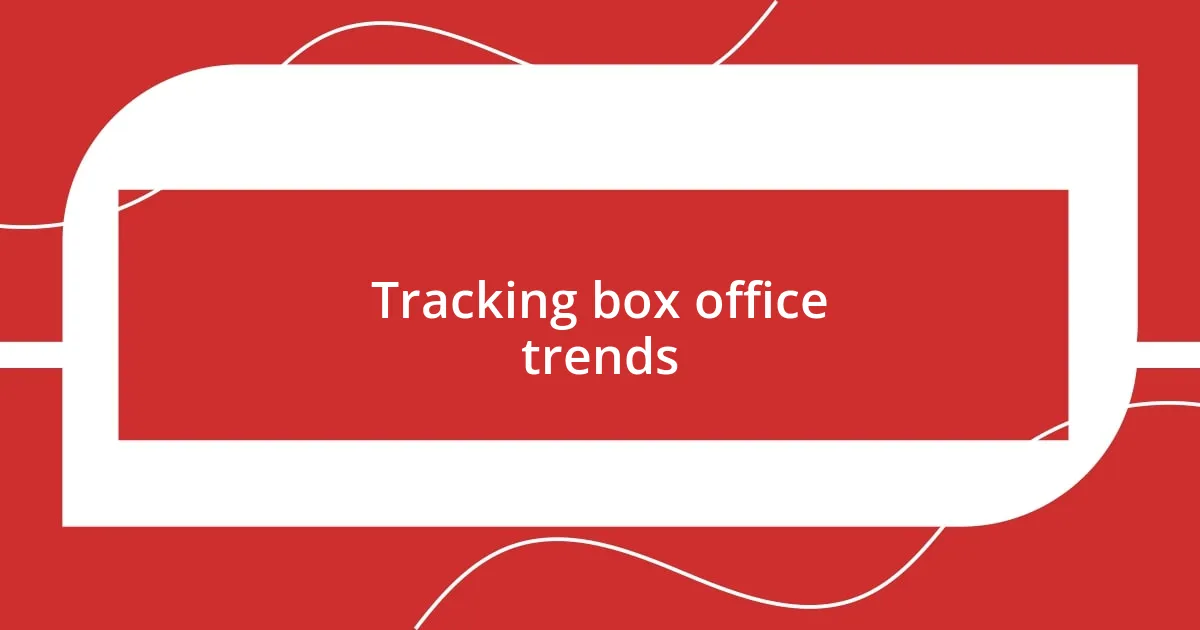
Tracking box office trends
Tracking box office trends is a fascinating endeavor that allows me to dig deeper into the cinematic landscape. I often find myself analyzing how different genres perform over time. For instance, I’ve observed that certain types of films, like superhero blockbusters, tend to dominate summer seasons, while horror films can find unexpected success during October, capitalizing on the Halloween spirit. This cyclical pattern captivates me, as it reflects cultural shifts that resonate with audiences.
It’s intriguing how the varying release strategies also impact box office outcomes. I’ve seen limited releases, which can spark a grassroots movement, turning a small gem into a national conversation. Take, for example, that art house film that I stumbled upon at a local theater. Initially, it had a modest showing, but with just a few glowing reviews, it became the talk of the town. This trend illustrates how the timeline of release can shape perceptions and draw viewers in in unexpected ways.
To quantify these trends, I’ve started keeping a close eye on box office performance metrics. These numbers reveal patterns that I find quite insightful. Tracking them helps me anticipate which films might emerge as surprises based on their early indicators. Below is a simple representation of how different film genres have performed over recent years, which I find useful in shaping my expectations.
| Genre | 2019 Revenue (in billions) |
|---|---|
| Action | 3.5 |
| Comedy | 1.8 |
| Horror | 1.2 |
| Drama | 1.0 |

Analyzing audience reactions
When I observe audience reactions to box office surprises, it’s like catching a glimpse into their collective psyche. The social media buzz after a film’s launch often tells me everything I need to know. For example, when Get Out was released, I remember the fervor online—a mix of shock, excitement, and introspection as viewers unpacked the film’s themes. Why do certain movies ignite such passionate discussions while others fall flat? That question fascinates me as it highlights how stories resonate differently with various audiences.
I also find it compelling how unexpected success shapes the narrative around a film. I once attended a screening of an indie movie that was practically created on a shoestring budget, yet it left the audience buzzing long after the credits rolled. The surprise of its quality and relatability really struck a chord with everyone. Why can a smaller production sometimes evoke a stronger emotional response than a big budget blockbuster? It seems that authenticity can often outshine flashiness, reminding us that storytelling, at its core, remains deeply personal.
Moreover, the distinction in audience reactions around genre-bending films reveals a lot about our evolving tastes. I vividly recall watching Parasite and being both surprised and thrilled by its twisty narrative and sharp social commentary. The perfect blend of humor and horror caught many off guard, leading to heartwarming conversations afterwards. It makes me wonder—are we, as audiences, ready to embrace these bold narratives, or are we still clinging to the familiar? I believe our reactions reflect a growing desire for depth and complexity in cinema, something that keeps me excited about what’s next at the box office.
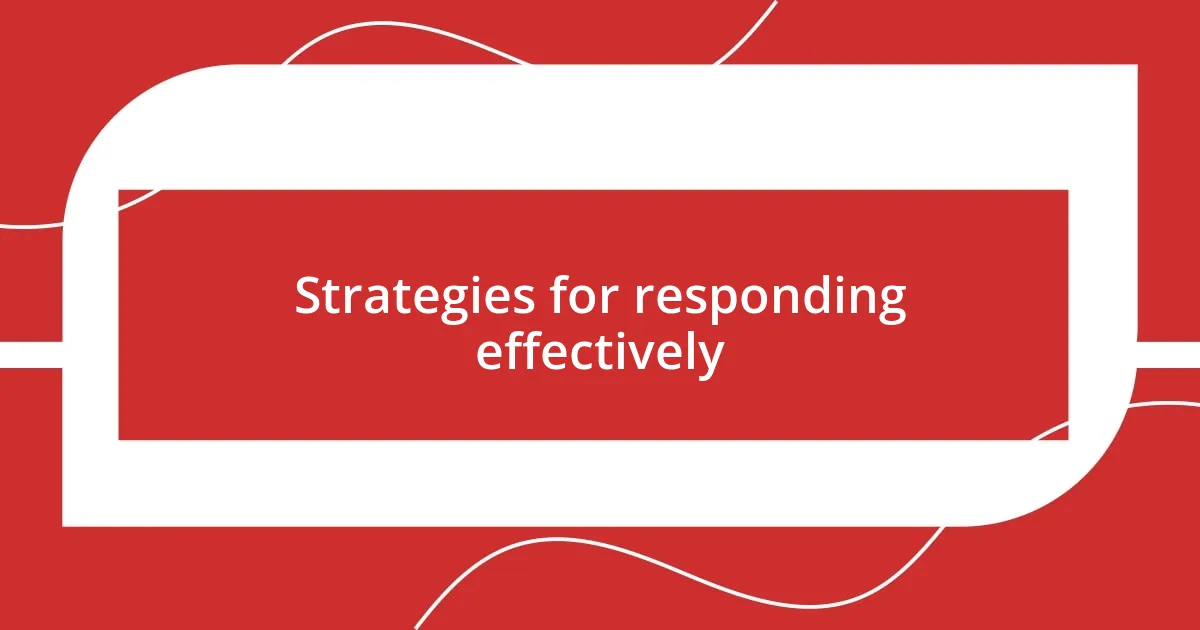
Strategies for responding effectively
When it comes to responding effectively to box office surprises, I think it’s crucial to develop a flexible mindset. I vividly remember the shock surrounding the success of Joker. I wasn’t ready for such a powerful reaction from audiences, and it pushed me to rethink my assumptions about what resonates with filmgoers. Have you ever had moments like that, where a film surprises you, challenging your preconceived notions? It’s these moments that remind me to approach each movie with an open heart, ready to recalibrate my expectations.
A useful tactic I’ve adopted is creating a dialogue with fellow movie enthusiasts. After watching a surprising hit, I often find myself chatting with friends or even strangers online to gather their perspectives. This not only broadens my understanding but also allows me to appreciate the diverse ways people connect with stories. I once posted a question on my social media, asking why certain films struck a chord with viewers, and the responses poured in. It was fascinating to see how personal experiences shaped their reactions, reinforcing my belief that film is an intricate blend of storytelling and personal connection.
Lastly, I believe keeping a pulse on the cultural context can dramatically enhance my responses to box office trends. For instance, when Black Panther became a cultural phenomenon, I immersed myself in conversations about representation and identity. It was eye-opening to understand why a film’s success can be rooted in broader societal themes that resonate deeply with audiences. How often do we consider the underlying messages a movie sends? By exploring these angles, I find that my appreciation for cinema deepens, offering layers of meaning that extend beyond mere box office figures.

Adjusting expectations for future releases
When it comes to adjusting expectations for future releases, I’ve learned to embrace a more nuanced perspective. I remember going into La La Land with high hopes, only to find myself confronted with a bittersweet ending that lingered in my mind long after the credits rolled. It taught me that not every anticipated film will follow the familiar tropes I expect. Instead of disappointment, I now view such experiences as an opportunity to appreciate bold storytelling choices. Have you ever had a similar awakening about a film’s direction?
I often find myself reflecting on the unpredictability embedded in cinematic releases. The surprise success of Knives Out took me aback; the clever writing and ensemble cast defied my initial assumptions about traditional whodunits. Often, I tend to mentally box films into genres, but that film reminded me of the magic that comes from bending those genre lines. Moving forward, I strive to keep an open mind and remind myself that some projects might take unexpected turns that can be utterly rewarding.
Lastly, I’ve recognized that box office surprises inform how I assess future films. The success of independent films like Moonlight has shown me the power of unique narratives in capturing audiences’ hearts. Each surprise release nudges me to recalibrate my expectations, making me eager for what’s next without allowing assumptions to overshadow the true essence of storytelling. Do you find yourself curious about what hidden gems await us next? Engaging with films on this level just makes the journey all the more exciting.

Sharing insights and reflections
Sharing insights and reflections can truly enrich the experience of watching films. I recall the moment Get Out shocked audiences, including myself, with its masterful blend of horror and social commentary. It was a profound experience, prompting me to reflect on my own views about race and societal norms. Have you ever found yourself questioning your beliefs after seeing a film? That’s the kind of transformative power cinema can wield.
After a surprising box office hit, I often dive into online discussions to see how different people interpret the same story. I remember chatting with a friend who adored The Shape of Water for its take on love and acceptance while I was more drawn to its visual storytelling. These conversations always illuminate how personal our connections to film can be, highlighting the diverse lenses through which we engage with narratives. What insights have you gained from others’ perspectives that altered your view on a film?
The reflections from these experiences help me navigate future releases with a richer understanding. I think back to when I saw Her and initially felt lost in its layers of emotional complexity. But discussing it later with a group of film buffs opened my eyes to the poignant themes of loneliness and connection in our tech-driven world. It makes me wonder, what other revelations await us in films we’re yet to see? Embracing this ongoing learning process keeps my passion for cinema alive and thriving.










